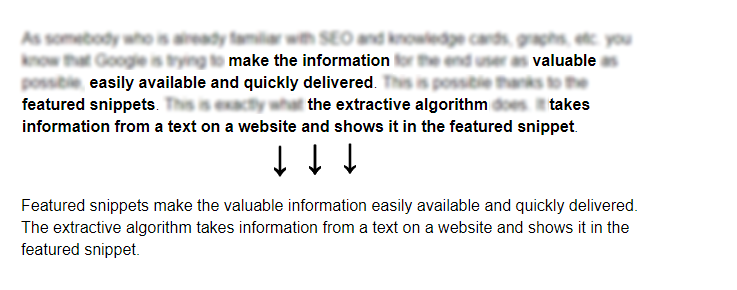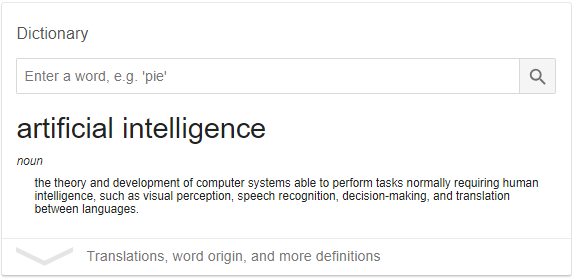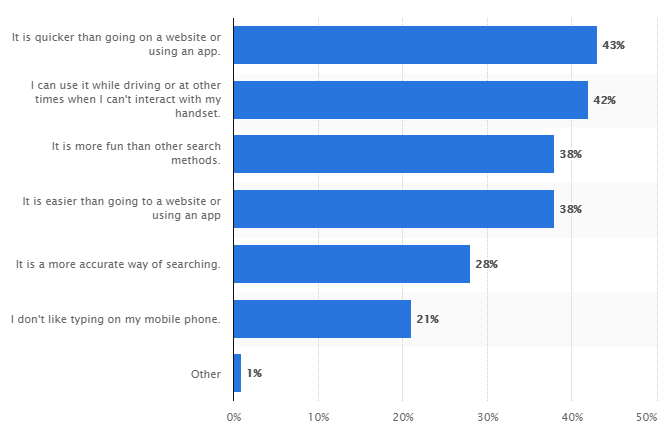The future of featured snippets: what is Abstractive Summary and how it can affect your online presence
15 June 2018 Leave a comment ALL-HANDS SEO
Google’s has rolled out a new algorithm update which can have a devastating effect on your online presence. The multi-document summarization based on two approaches abstractive and extractive is very likely to erase the necessity of citing web-resources at all. It means that with a new algorithm there is no longer a need to give credit to a website because the paraphrased content belongs to Google even though the seed of the article might be yours.
The world may be proud of the successful sequence-to-sequence framework implementation into the natural language processing. Can SEO experts be proud of that? With the multi-document summarization there might be a problem. Even though Google concentrated on Wikipedia articles being summarized and transformed the same thing may happen to your website.
Answer box intention
As somebody who is already familiar with SEO and knowledge cards, graphs, etc. you know that Google is trying to make the information for the end user as valuable as possible, easily available and quickly delivered. This is possible thanks to the featured snippets. This is exactly what the extractive algorithm does. It takes information from a text on a website and shows it in the featured snippet.
The main purpose of such an answer box is to give a quick answer to the question. It’s fast, simple and efficient. And it kills your SEO. When a user sees such a card, there is no need to make it any further, i.e., to the website. Thanks Google for extracting the information from my website and placing it on your website with not a single reference to where you’ve taken it.
If you’d like to learn more about answer boxes or featured snippets and how to optimize for them check this article.
But what does the abstractive algorithm do?
The abstractive algorithm takes the extracted piece of text or any other piece of content and paraphrases it, grasping the major points of the given text and simulates the human writing as shown in the example below.
Featured snippets under attack
So now, when you know what the featured snippet is and how to get listed in one, you can also see that they vary in their forms a little. Let’s try to google something and see what happens. We will search for “What is artificial intelligence?”
If we actually decide to follow the answer and try to get more info about this term, we will see that the answer to “What is artificial intelligence?” is given by a website dictionary.com which we can see if we click on the word “Dictionary”.
Let’s see what happens if there is another resource. For this purpose let’s change our query to “What is AI technology?”.
This is the answer that we get. We can see that the resource of this answer was actually given credit to.
Now, think for a second what is going to happen if the abstractive summarization algorithm will be applied to extract information from different websites or even from Wikipedia and generate content based on the fed data to this algorithm?
Does it mean that the ordinary featured snippets will be gone? Are the answers to users queries going to be added into a database such as a simple dictionary? Will Google simply paraphrase your content and give no reference to your website?
In this case, we’re speaking about the written, visual content. Now, if we think about voice search which may become the major searching approach. According to Statista, 2015, here are the main reasons for using voice assistants to perform a search.
When voice assistant will read the featured snippet which appeared in SERPs, based on generated by AI content, many websites will find themselves in a tough position because they will start losing traffic enormously quickly.
The future of plagiarism
The new horizons stimulate us to think about a possibility of the plagiarism advanced techniques that may appear in the future. If the content is extracted and then abstratified to generate new content based on different web resources will the algorithm know how to give references to people’s works correctly?
It’s no secret that even a small business can benefit from using AI and it is already the future of digital marketing. Such content generating projects as AI writer or Articoolo are already making enormous progress in generating articles.
What if a company decides to generate a non-human article using an AI writer? Who will be the owner of this article the company or the AI writer? Using the abstractive summarization without any credits will allow any copywriter simply copy and paste the information onto their website and do whatever they want with it.
If I see the already-made answer on a knowledge card or answer box or whatever with no credit does it mean that I can copy it 100% and use it for my own purposes? No doubts that I might be punished for plagiarism by Google itself. But wait a minute, does Google plagiarize your content? If so, this is not the first case when Google violates their own guidelines.
Conclusions
Even though Google’s first intention is to make users happy, create a safe Internet environment and deliver the best user experience we may question their good intentions about many businesses on the web. We should reconsider the Google’s friendliness and think about the hidden danger for SEO, finding a way to stay afloat.
Tags: abstractive summarization, featured snippets, future SEO
Like this article? There’s more where that came from.
- 5 Questions to Ask Yourself Before Paying for Rank Tracking Software
- 5 Serious Mistakes Beginner SEOs Make and How to Fix Them
- Why We Use Google’s New Link Attributes and You Should Too
- Title and Description in 2021: Why Google Rewrites SEOs’ Meta Tags
- What We Should Learn From Google’s “About This Result” Feature





